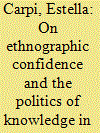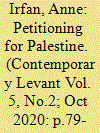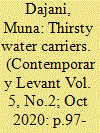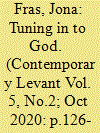|
|
|
Sort Order |
|
|
|
Items / Page
|
|
|
|
|
|
|
| Srl | Item |
| 1 |
ID:
175147


|
|
|
|
|
| Summary/Abstract |
In Jordan mansaf has become a national symbol, consumed on major social occasions, served in various forms to tourists and visitors, and imbued with a set of historical and socio-cultural associations. Across historical Syria (Bilād ash-Shām) and northern Arabia dishes similar to what is now considered mansaf have been made and consumed in different historical contexts and have often been linked with ideas of hospitality and protection given to guests and strangers, whose alterity is negotiated and incorporated through the sharing of food. In Jordan particularly, the image of a ‘Bedouin’ feast dish of domestically produced pastoralist ingredients carries a rich symbology of hospitality and welcome, resonant of imagined historical continuities and a shared cultural heritage. This lends the modern ‘national dish’ symbolic power as a tool of nation-building in the fraught and complex environment of modern Jordan, where many claimed identities and solidarities coincide and compete. Far from being a timeless or unchanged relic of an imagined pre-modern desert life, mansaf, its ingredients and the way it is made, served, eaten and deployed have emerged out of a particular set of historical contingencies and are tied closely to projects of identity formation and state-building within the Hashemite Kingdom of Jordan. Focusing on this historical constructed-ness and changing practices of making, serving and talking about mansaf, as well as the social relations it reflects, enacts and (re)produces, this article seeks to use the dish as a lens to examine questions of changing political economy and sociality in Jordan.
|
|
|
|
|
|
|
|
|
|
|
|
|
|
|
|
| 2 |
ID:
175146


|
|
|
|
|
| Summary/Abstract |
Fieldworkers in politically sensitive spaces traditionally need to negotiate their presence in the field with local (in)formal authorities and epistemic power-holders. I illustrate how attempts at both holistic politicisation and neutralisation of the research space can question ethnographic knowledge production. Drawing upon the anthropology of silence and agnotology, I interrogate the whats and hows of ethnographic authority and local validation of ethnographic research when political and epistemic powers complexly and discontinuously overlap. By examining how knowledge is boasted about, concealed or questioned by political and humanitarian actors, I examine the ways in which a lack of political protection, as well as overt advocacy, shape different modalities of access – or lack of access – to the field. Against the backdrop of a growing body of literature on the ethics of research in settings affected by political transformations and emergency crises (such as today’s Arab Levant), I try to upend ethnographic confidence as a self-centred process of knowledge production. I instead rethink it not only as an ethical but also an inter-subjective effort towards a more effective integration of the counter-epistemologies of field interlocutors into our own research.
|
|
|
|
|
|
|
|
|
|
|
|
|
|
|
|
| 3 |
ID:
175142


|
|
|
|
|
| Summary/Abstract |
In the second half of the twentieth century, stateless Palestinian refugees regularly submitted petitions to international authorities, particularly the UN. In these petitions, the refugees demanded their rights and invoked the UN’s liberal internationalist discourse to assert the justice of their cause. This article explores what these petitions reveal about contentious politics among the Palestinian grassroots in the refugee camps. In so doing, it recasts Palestinian refugee camp communities as actors consciously engaged with international politics, and key drivers in internationalising the ‘Question of Palestine’. By unpacking the petitions’ internationalist aspects, the article also situates Palestinian refugee history within the broader context of post-war global governance. Finally, the analysis presented here challenges the state-centrism of existing historiography on petitioning, which examines the practice largely in relation to the growth of the state. By contrast, the case study of Palestinian petitioning shows that the practice can also be important in a setting of statelessness. This article therefore makes a series of contributions to understanding not only Palestinian political history, but also the practice of petitioning and the dynamics of post-war internationalism.
|
|
|
|
|
|
|
|
|
|
|
|
|
|
|
|
| 4 |
ID:
175144


|
|
|
|
|
| Summary/Abstract |
The renowned Syrian ʿālim Shaykh Muhammad Sa’id Ramadan Al-Buti was one of the world's leading scholarly representatives of Sunni Islam in contemporary times. The written debates that occurred between the Damascene ʿulamā’, al-Buti, and the iconic Salafi scholar and ḥadīth scholar Muhammad Nasir al-Din al-Albani constitute one of the most important and comprehensive intra-Muslim debates in the twentieth century, having helped to define a clear schism between the neo-traditionalist position and its presumed opposite: Salafism. This article suggests that the rhetoric of anti-Salafism needs to be studied further to better understand contemporary currents in modern Islamic intellectual history. The adversarial rift that crystallised in the thriving Shāmī scholarly milieu of the 1980s and 90s informed the existence of a distinct neo-traditionalist school both in the West and many parts of the Muslim world for the latter part of twentieth century and to this day. At the intersection of political competition, textual methodology and competing visions of heresy and history, Islamic neo-traditionalism represents a key contestant in the battle for religious authority in contemporary Islam under the secular nation-state. Between championing a constructed concept of a ‘tradition’ for modern times and those who seek to return to a pristine ‘true Islam’, a deadlock is inevitable.
|
|
|
|
|
|
|
|
|
|
|
|
|
|
|
|
| 5 |
ID:
175143


|
|
|
|
|
| Summary/Abstract |
This paper provides an overview of settler-colonial imaginaries of water and how they have cast the area of Sahl al-Battuf as the imagined site of a reservoir and a critical junction for the realisation of the Israeli National Water Carrier. Focusing on the events surrounding the construction of this project, I show how Palestinians inside Israel, at that time living under Israeli military rule, engaged with the state to protest and negotiate their claims over land and water. The findings reveal how settler-colonial imaginaries produce uneven waterscapes and have an enduring impact on Palestinian environmental imaginaries. Narrating and analysing water histories from below allows for a better exploration of indigenous opposition and reclamation of their water use and management. Palestinian struggles for water and land reveal how such mobilisation was shaped by the state’s relationship with its estranged Palestinian populations in the midst of citizenship claims, and therefore show how such resource struggles were being constituted through water as a vessel for making claims of recognition.
|
|
|
|
|
|
|
|
|
|
|
|
|
|
|
|
| 6 |
ID:
175145


|
|
|
|
|
| Summary/Abstract |
Sound and spoken language play a major role in contemporary Islamic media. On Islamic advice programmes in Jordan, a genre of radio show in which listeners call in to the station with questions regarding pious Sunni Muslim conduct, broadcasters use language in ways that conveys authority to the Islamic textual tradition, and therefore presents their responses as legitimate advice for pious Muslims. By manipulating the language of quotations, broadcasters both ‘entextualise’ segments of language and develop dialogical relationships with Islamic texts – principally, the Qur’an and hadith literature – as well as the audiences addressed and co-present callers. Though the programmes provide a forum for public discussion of religious issues, a linguistic anthropological analysis nevertheless reveals the persistent asymmetry and exclusion inherent in this type of mediated interaction: hosts remain supremely authoritative dispensers of advice to lay callers, and the programme’s listenership is idealised as a pious Jordanian Sunni Muslim audience from which non-devout individuals are excluded. Details of communicative interaction must, therefore, be given careful attention when examining the role of religious media in the contemporary Middle East.
|
|
|
|
|
|
|
|
|
|
|
|
|
|
|
|
|
|
|
|
|